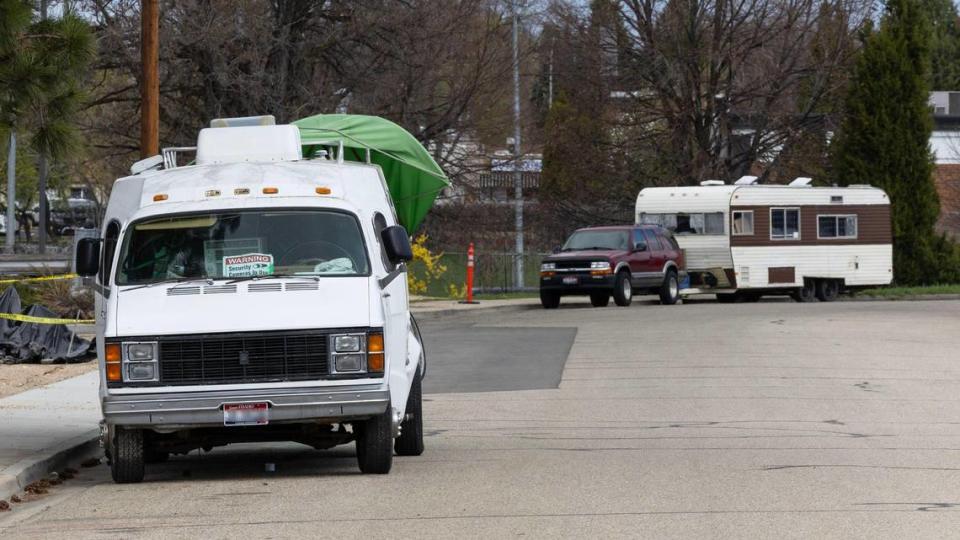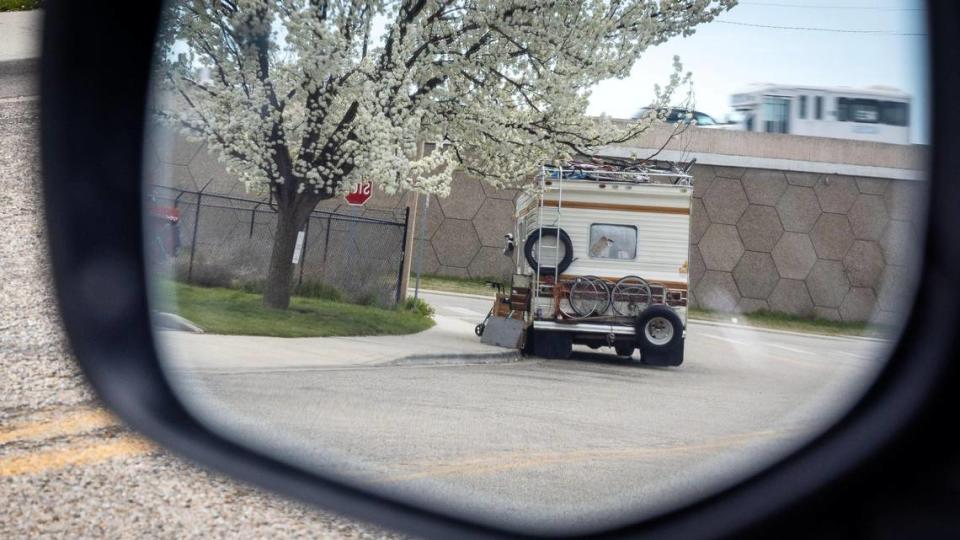How an advocate says Boise police skirt ban on ticketing homeless people for camping
Michael Young, who has been homeless in Boise for over two years, spent his nights for a year sleeping along the Boise River.
He typically slept without a tent in either a hammock or on the ground, whether by the river or near city streets. After a particularly rough day on the streets in February, Young finally decided to use a tent he had. The next day, Young woke up to a Boise police officer writing him up with a misdemeanor citation for camping.
Tickets like the one Young received are not rare among the homeless community, according to police records and interviews with housing advocates and homeless people.
Young told the Idaho Statesman in an interview at Interfaith Sanctuary that he got five citations last year and four so far in 2024.
“That’s because I keep moving around, playing pinball with them,” he said.
During the day, many homeless people spend time in the backyard of the Corpus Christi House day shelter and along Cooper Court, which is near Interstate 184 and the River Street exit. Jodi Peterson, executive director of the nearby Interfaith Sanctuary, told the Statesman that homeless people, especially in the Cooper Court area, are commonly ticketed for disorderly conduct, indecent exposure, open containers, consumption of alcoholic beverages in public spaces, trespassing, camping in public places, and having glass containers in parks.
According to records obtained by the Statesman through a public-records request, Boise police issued over 120 tickets for infractions and misdemeanors in the area for the types of crimes Peterson reported, for 13 months from January 2023 through January 2024.
David DeRoin, a former attorney in the Ada County Public Defender’s office and co-founder of Wrest Collective, a Boise nonprofit law firm, told the Statesman by phone that infractions include consuming alcohol in a public place or having a glass container in a park. Misdemeanor citations include trespassing, disorderly conduct, indecent exposure, and camping in a public place.
Infractions are punishable by a $25 or greater fine. People cannot be sentenced to jail for a infraction but must appear in court. DeRoin said most of the time, homeless people do not show up, so a judge enters a default judgment and imposes a $90 penalty. If a person doesn’t pay, the fine goes to collections, but the person won’t be arrested.
Misdemeanors are punishable by no more than six months in jail or a $1,000 fine. When a person doesn’t appear in court, the judge issues a warrant for police to arrest the person for failure to appear, DeRoin said.

Mayor Lauren McLean has been less supportive of homeless ticketing than her predecessor, David Bieter, who argued in favor of the city’s right to ticket homeless people. When the 9th U.S. Circuit Court of Appeals ruled against the city, Boise appealed to the Supreme Court, which in December 2019 declined to hear the appeal. McLean, who was elected mayor that month, had told the Statesman that she opposed ticketing people who are homeless, though she would not have withdrawn the case had the Supreme Court taken it up.
The appeals court said Boise could not issue tickets for sleeping on the street if there is no space in Boise’s homeless shelters.
McLean also made affordable housing and prevention of homelessness a key issue in her campaign for re-election in November, and for the city before and since.
Even so, homeless people say they are still being ticketed for things like smoking cigarettes in the park or camping quietly along the Boise Greenbelt.
Boise police skirt Martin v. Boise, Interfaith leader says
In 2019, the 9th Circuit, whose jurisdiction includes Idaho and eight other Western states, decided in Martin v. Boise that its states could not punish homeless people for sleeping outside when cities didn’t have adequate shelter space available. A group of homeless people sued the city of Boise in 2006, saying they were unlawfully ticketing people for being homeless.
Since the 2019 decision, the city of Boise and its Police Department say they work closely with homeless shelters and have worked to avoid issuing citations to homeless people sleeping outside unless there are safer alternatives for them in shelters. But Peterson and other homeless advocates say homeless people are still ticketed when they are sleeping outside.
“We don’t exactly nail the Martin-versus-Boise rules,” Peterson said. “City law can get around that, and (police) write different kinds of tickets.”
Ryan Kempter, who has been in and out of shelter for the last several years, now spends his nights in a bed at Interfaith and spends the day at Corpus Christi. He witnesses many interactions between Boise police and homeless people.
“They will ride up and down the alley (Cooper Court) almost 40 times a day,” Kempter said. “And they will ride up on people and stop them and say “What are you doing? What’s that right there in your hand?”
Kempter and Young said police are often abusive when they confront homeless people to give tickets. Both say they have been kicked awake while they are sleeping.
“Sometimes they’ll straight-up kick you to wake you up,” Young said. “And sometimes they don’t know where your head is at or where your feet are. Sometimes they kick you in the feet, and sometimes they kick you in the head.”
Parking tickets are ‘even worse’
Though Young sleeps on the streets and Kempter sleeps at Interfaith, both say they have had brief stints sleeping in their cars. They said police tickets are even more frequent for people living in their cars or RVs.
“When you’re in a vehicle it’s even worse, because they know that when you’re in a vehicle you are more exposed,” Kempter said. “There’s only so many places you can go, there’s only so many spots that you can be, and they, on purpose, will park somewhere around where homeless people park, just waiting to see who shows up.”
Boise code requires that vehicles be moved more than 600 feet from the previous parking spot every 72 hours. But often, Young said, police issue warnings before the 72-hour limit. Police issue infraction citations for extended parking that cost $33.25.
Young said he often got tickets and warnings in years past for parking beyond the 72-hour limit before he had been there for even 24 hours.
“Yeah, there was one time I straight-up started marking our own (expletive) tires with chalk and taking a picture of it, like we just got here,” Young said.
The records the Statesman obtained showed that the city issued 870 tickets for extended parking and 116 tickets for vehicles parked on a sidewalk from January 2023 through January 2024.
Boise police ‘work to find safe places to stay’
The Boise Police Department declined a request from the Statesman to interview, accompany and photograph officers who frequently interact with homeless people.
“All officers have discretion and use it in all interactions,” spokesperson Hayley Williams said in an emailed statement. “They base their decisions on each individual scenario, and we wouldn’t be able to generalize this topic.”
She added in a later email that bicycle officers, who frequently patrol streets where homeless people spend time, “work very closely with local service providers to help people experiencing homelessness in Boise. They work seven days a week, and part of their job is building relationships with people in the homeless population. They know many of them in Boise by name and often work with them over weeks, months, and years to find safe places for them to stay.”
Peterson confirmed that Boise bicycle officers work closely with Interfaith on any of its concerns. She said police do ask when the shelter is at capacity for bed space, or whether the shelter can take police referrals of people needing a place to stay. But she said this communication doesn’t involve the tickets that homeless people receive.

Problems with ‘criminalizing homelessness’
Connor O’Hora, outreach program specialist for CATCH, or Charitable Assistance to Community’s Homeless, a nonprofit that works to house people experiencing homelessness in Ada and Canyon counties, told the Statesman that homeless people are “ticketed frequently and miss court dates and are then arrested for missing those court dates” because they lack transportation and ways to communicate.
Those problems “make all appointments, including court proceedings, hard to keep,” O’Hora said in an email.
DeRoin, who said he represented many homeless people during his time in the Ada County Public Defender’s Office, said someone arrested on a failure-to-appear warrant spends 24 hours in jail if arrested on a weekday, or through Sunday if arrested on Friday night or the weekend.
The arrested person is often appointed a public defender and scheduled to enter a plea in front of a magistrate judge. If someone pleads guilty, DeRoin said, the person is usually given credit for the jail time already served.
He said judges usually waive court fees and misdemeanor fines. Magistrate judges are made aware of a person’s inability to pay before the hearing, DeRoin said.
“In my experience, it became a rotating door,” DeRoin said. “You would see the same people many times, people coming in for the same thing. And they get thrown in jail for a weekend, and they plead out for credit-time served.”
Peterson sees the same process unfolding with many Interfaith guests. She sees many homeless people ending up in jail after being arrested for previous failure to appear.
“The criminalization of homelessness is an expensive nonsolution,” Peterson said. “It doesn’t fix anything.”
DeRoin said in many cases, people may have a good defense against their charges. He said lawyers may tell their clients that they could get acquitted of the charges, but acquittal requires maintaining contact with their lawyers and multiple court appearances.
Even that can be difficult.
“When you’re worried about where you’re getting your next meal, or where you’re spending your next night, you’re not so concerned about your court appearance in six weeks from now,” he said.
This Boise law aimed to house poor residents. The Legislature could take that away
Need an affordable apartment? This new Boise complex is inviting applications

